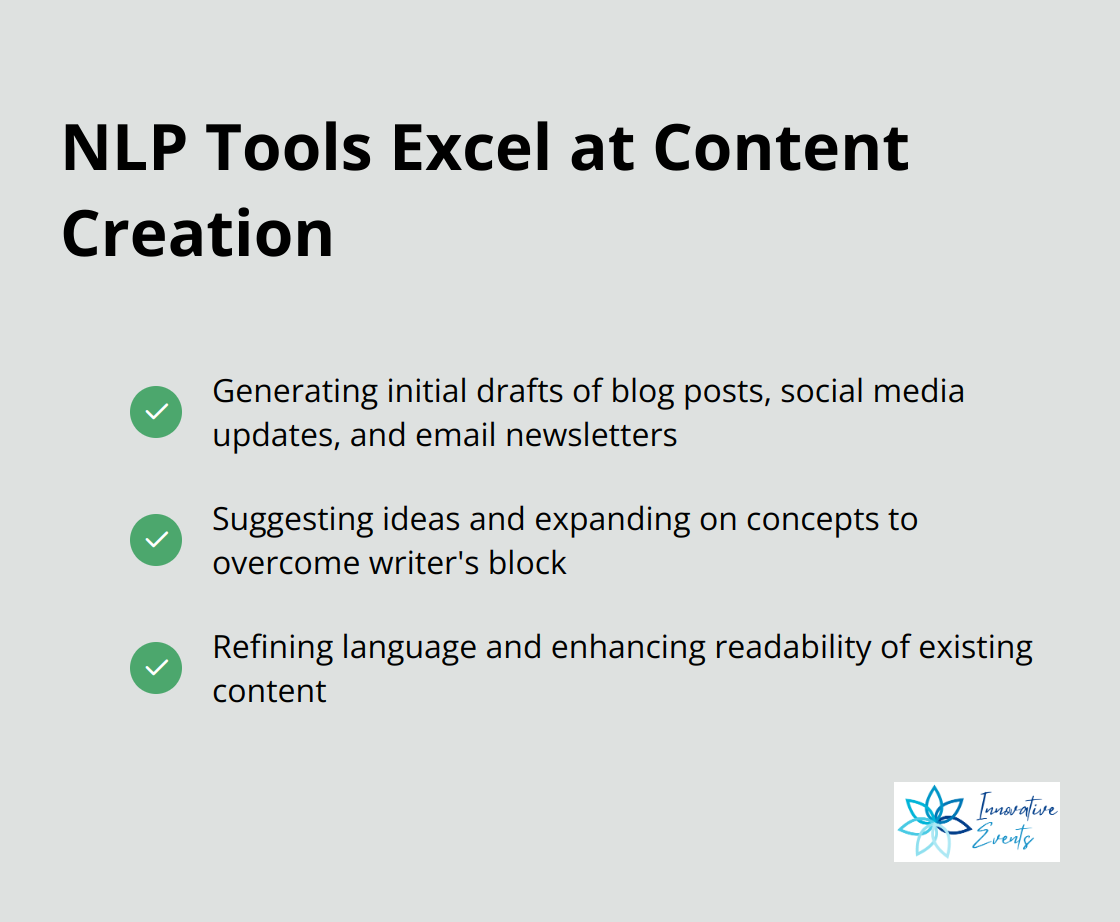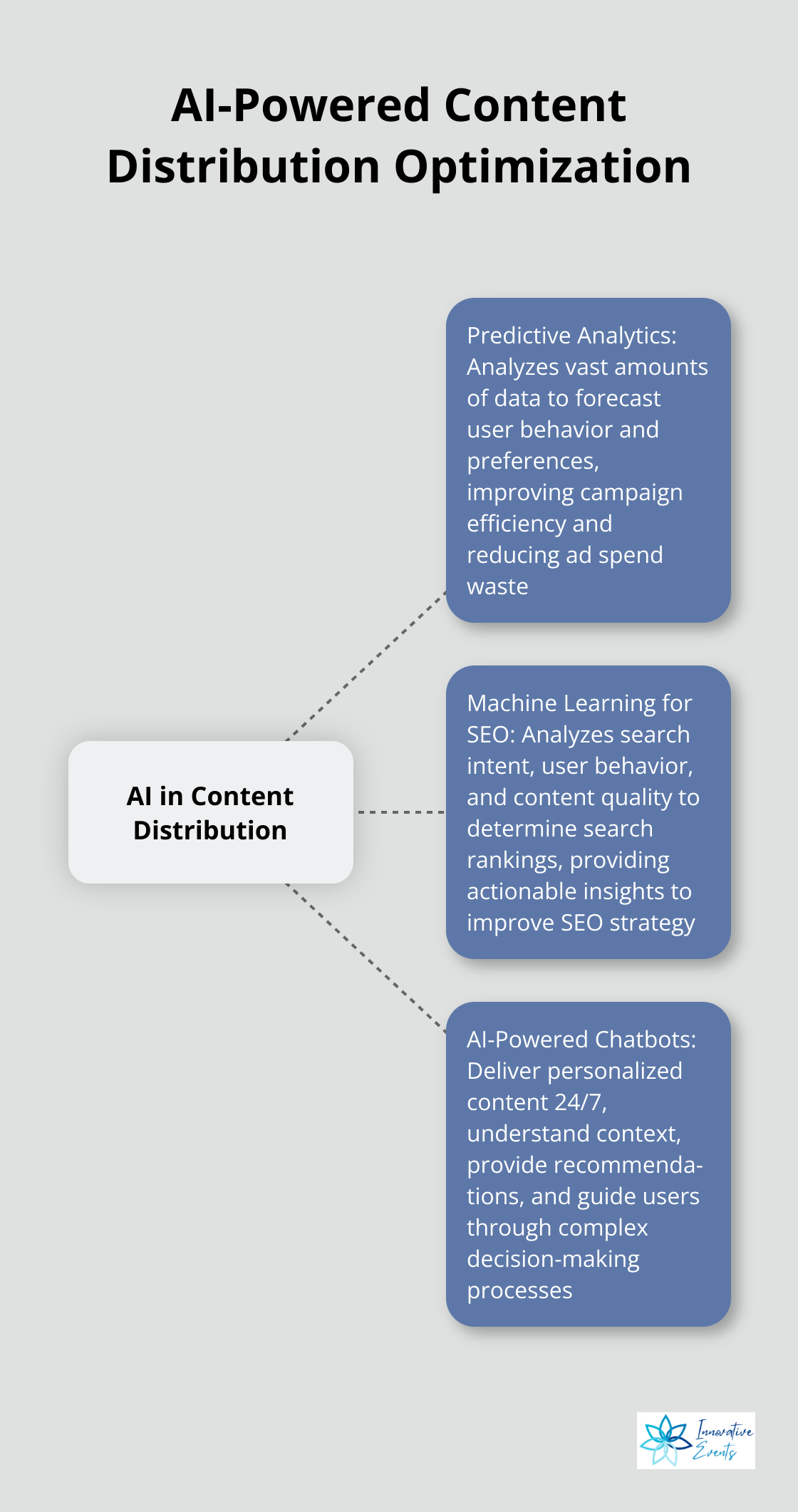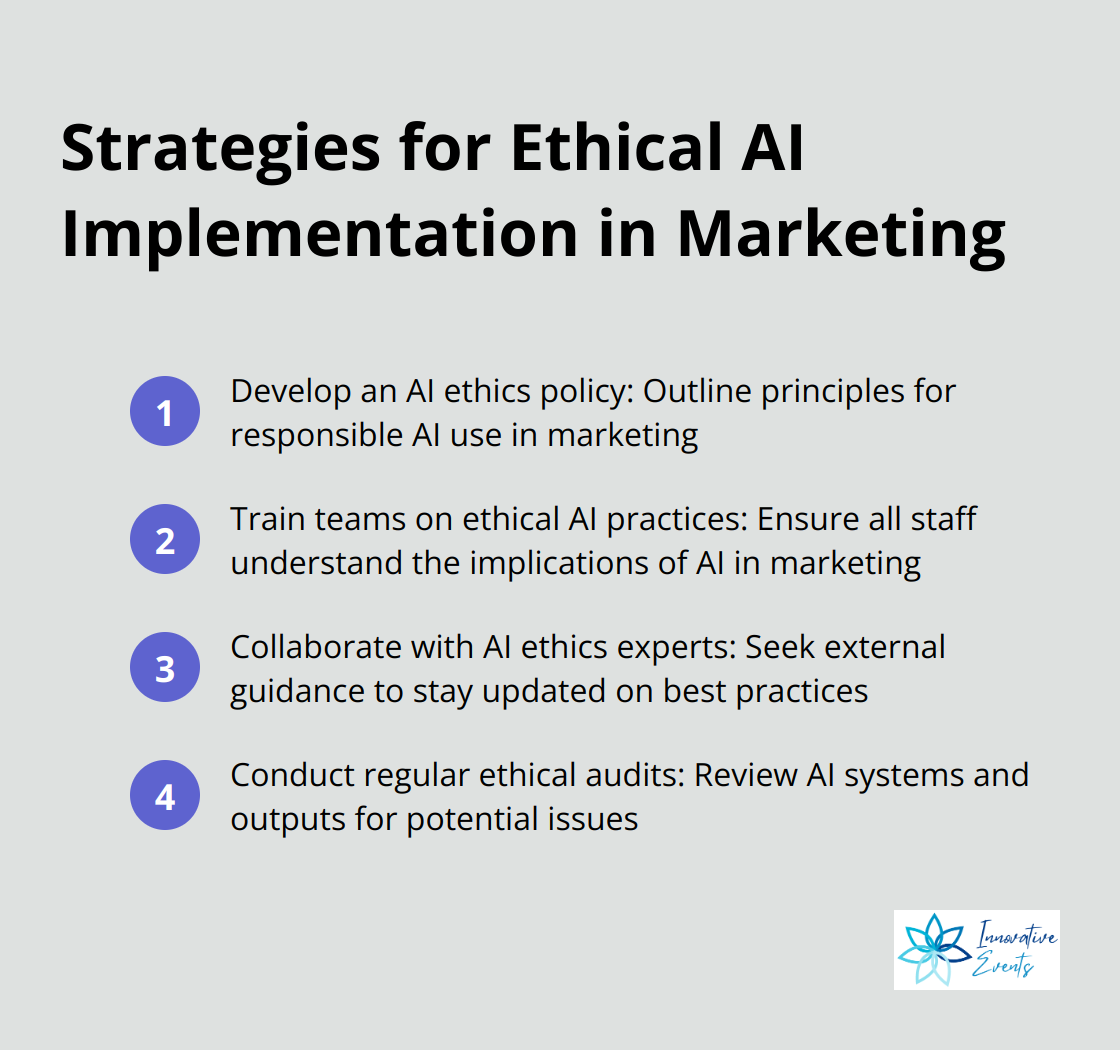Artificial Intelligence content marketing is reshaping the digital landscape. At Innovative Events, we’ve witnessed firsthand how AI tools are revolutionizing content creation, distribution, and optimization.
This blog post explores the cutting-edge AI technologies transforming content marketing strategies. We’ll also examine the ethical considerations and challenges that come with this technological shift.
How AI Tools Are Revolutionizing Content Creation
AI is transforming how companies engage with their audiences, making marketing more intelligent, data-driven, and responsive to individual customer needs. These tools enhance efficiency and open new possibilities for creativity and personalization.
Writing Assistance with Natural Language Processing
Natural Language Processing (NLP) has advanced significantly. Tools like GPT-3 and its successors now generate human-like text, making them invaluable for content marketers. Accenture provides digital marketing transformation consulting services to help clients create customer experiences that keep up with change.
NLP tools excel at:

Human oversight remains necessary to ensure brand voice consistency and factual accuracy. These tools assist rather than replace human creativity.
AI-Powered Visual Content Creation
AI-generated visuals have exploded, with tools like DALL-E 2 and Midjourney leading the charge. These technologies create unique images and videos based on text prompts, reducing time and cost associated with visual content production.
This shift impacts:
- Custom illustrations for blog posts and social media
- Product visualization for e-commerce
- Personalized video content for targeted marketing campaigns
Automated Content Curation and Personalization
AI algorithms revolutionize content curation and personalization for audiences. Machine learning models analyze user behavior, preferences, and engagement patterns to deliver highly relevant content.
In marketing, this translates to:
- Dynamic website content that adapts to individual user interests
- Personalized email campaigns with tailored product recommendations
- Content recommendation engines for blogs and news sites
Strategic Implementation of AI Tools
While AI tools offer tremendous potential, their use requires a strategic approach. The key lies in leveraging AI to augment human creativity and insight, not replace it. As we explore these technologies, new frontiers in content marketing continue to emerge.
The next frontier in AI-powered content marketing involves distribution and optimization. AI not only creates content but also ensures it reaches the right audience at the right time. Let’s explore how predictive analytics, machine learning for SEO, and AI-powered chatbots are reshaping content distribution strategies.
How AI Optimizes Content Distribution
AI revolutionizes content distribution and optimization. This technology doesn’t just create content; it ensures it reaches the right audience at the perfect moment. Let’s explore the game-changing ways AI reshapes content distribution strategies.

Predictive Analytics: Targeting with Precision
AI-powered predictive analytics improves campaign efficiency within digital marketing. These systems analyze vast amounts of data to forecast user behavior and preferences with remarkable accuracy. Adobe’s Sensei AI platform predicts which content will resonate with specific audience segments, allowing marketers to tailor their strategies accordingly.
This precision targeting improves engagement rates and significantly reduces ad spend waste.
Machine Learning Boosts SEO Performance
SEO optimization extends beyond keywords. Machine learning algorithms now analyze search intent, user behavior, and content quality to determine search rankings. Google’s RankBrain uses AI to interpret search queries and deliver more relevant results.
To leverage this, create comprehensive, high-quality content that answers user queries thoroughly. Tools like MarketMuse (an AI-powered content intelligence platform) analyze your content against top-ranking pages, providing actionable insights to improve your SEO strategy.
AI-Powered Chatbots: 24/7 Content Delivery
Chatbots and virtual assistants have evolved from simple FAQ responders to sophisticated content delivery systems. These AI-driven tools now understand context, provide personalized recommendations, and even guide users through complex decision-making processes.
Many companies have implemented AI chatbots on their websites, resulting in increased lead generation and improved customer satisfaction scores.
Balancing Automation and Human Touch
To maximize the effectiveness of AI in content distribution, maintain a balance between automation and human touch. While AI excels at data analysis and personalization, human creativity and empathy remain irreplaceable in crafting compelling narratives and building genuine connections with your audience.
As we move forward, it’s important to consider the ethical implications of AI in content marketing. The next section will explore the challenges and considerations that come with this powerful technology, ensuring responsible and effective implementation.
Navigating the Ethical Landscape of AI in Marketing
Preserving Authenticity in AI-Generated Content
AI tools produce content at scale, but authenticity remains paramount. At Innovative Events, we use these tools to enhance human creativity, not replace it. AI generates initial drafts or ideas, while human writers refine and personalize the content to align with brand voice and values.
To implement AI effectively, establish clear guidelines within your content creation process. Define tasks AI can handle autonomously and areas that require human intervention. This balance maintains authenticity that resonates with audiences while leveraging AI’s efficiency.
Mitigating Bias in AI Systems
AI systems can unintentionally perpetuate or amplify biases present in their training data. This issue concerns content marketers, as biased outputs could alienate audience segments or damage brand reputation.
To address this, marketers should:
- Audit AI-generated content regularly for potential biases
- Diversify data sets used to train AI models
- Implement human oversight to catch and correct biased outputs
Companies offer AI fairness tools to identify and mitigate bias in machine learning models. These resources can improve the quality and inclusivity of AI-generated content significantly. The FAIR principles serve as a framework for promoting ethical AI development by minimizing biases at the foundational level of data management.
Safeguarding Data Privacy in AI-Driven Marketing
AI’s power in marketing often relies on vast amounts of consumer data. However, regulations like GDPR and CCPA make data privacy and security non-negotiable.
We recommend implementing a robust data governance framework that includes:
- Clear consent mechanisms for data collection
- Transparent communication about AI’s use of customer data
- Regular security audits of AI systems and data storage
Consider adopting privacy-preserving AI techniques (like federated learning) which allow AI models to learn from decentralized data without direct access. This approach balances personalization with privacy concerns. Other strategies include adopting privacy-by-design principles, investing in AI for data anonymization, and ensuring transparent data practices.
Ethical AI Implementation Strategies
To harness AI’s power while building audience trust, marketers should:

These strategies help create a foundation for ethical AI use in content marketing, fostering long-term success and sustainability.
Final Thoughts
AI has transformed content marketing, revolutionizing creation, distribution, and optimization strategies. From NLP-powered writing assistance to AI-generated visuals, these tools enhance efficiency and unlock new creative possibilities. We anticipate further integration of AI with augmented reality, advanced sentiment analysis, and AI-driven content strategy optimization in the future.
Marketers who want to embrace artificial intelligence content marketing should educate themselves and their teams about AI technologies and their applications. They can identify areas where AI enhances current processes and gradually integrate AI tools into their workflow. It’s important to establish clear guidelines for AI usage and maintain human oversight to ensure quality and brand consistency.
At Innovative Events, we recognize the potential of AI to optimize content marketing efforts. We combine cutting-edge technologies with human expertise to create impactful, efficient, and personalized content strategies that resonate with target audiences. The key to success lies in embracing innovation while maintaining a strong ethical foundation (just as we help busy executives enhance their health and performance through our personalized, integrative lifestyle program).

